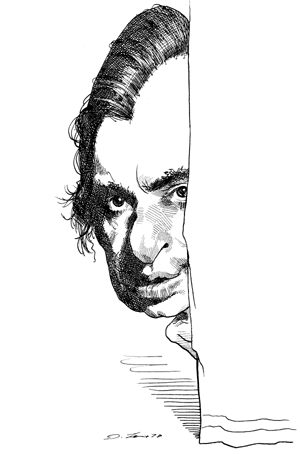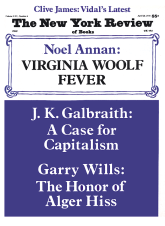The narrator of Gore Vidal’s new novel, Teddy Ottinger, is a surgically revamped bi-sexual beauty sharing many characteristics with one of his previous heroines. The hero she does most of her narrating about, James J. Kelly, a k a Kalki, has come to announce the end of the world. Not to put too fine a point on it, in Kalki Myra Breckenridge meets Messiah.
But just because two of Vidal’s long-term preoccupations can here be seen snuggling up to each other is no reason to be snooty. Their coupling is punctiliously discreet, intromission occurring with a minimum of fanfare (“I shall not describe Kalki’s genitals”) somewhere in the vicinity of page 79. Salaciousness is never permitted to intrude. However famous it has helped to make him, social satire is the most minor vein in Vidal’s work. Kalki, lacking even the sensationalism of Myra Breckenridge, ought logically to be minorissimo. Yet it somehow manages to be a very enjoyable literature invention—a term I borrow gladly from the publicity handout accompanying my proof copy. Kalki might not be the full thing as literature, but it is undeniably some kind of invention, even if several components of the mechanism are recognizable from earlier devices patented by the same busy man.
The main reason for the enjoyability of this new literature invention is the piercing sibilance with which Vidal’s obsessions come hissing through the seams. In his essays he has given us a body of sane comment for which it is difficult to be sufficiently grateful—few contemporary writers have told us so much about the world. But in his essays he does not really tell us a lot about himself, least of all when he makes a show of frankness. You would think, for example, that he despised power, wealth, privilege, and glamour without being drawn to them. But his literature inventions invariably demonstrate that he is very strongly drawn to these things. And it is valuable to find this out, since the knowledge lends his criticisms even more force. He would be a less impressive moralist if we thought him invulnerable to the passions he attacks.
Unlike Myra, Teddy is no movie buff. She is an aviation buff instead. It quickly becomes obvious that Vidal has less interest in airplanes than in the movies. Teddy’s enthusiasm is consequently a bit abstract. She worships the memory of Amelia Earhart. (Significantly, this particular idea comes most intensely to life when Teddy speculates about the possibility of ousting Shirley MacLaine from the title role in the projected bio-pic: Myra rides again.) There is a fleeting obeisance to Jacqueline Cochrane. Mention of these lady fliers sorts well enough with Teddy’s feminism, but it is not enough in itself to convince the reader that she finds liberation in the wild blue yonder. The only thing that would do that would be a vividly transmitted sense of what it feels like to be mad about flying.
But the author doesn’t possess, and can’t convincingly simulate, any real feeling for the nuts and bolts of the matter. As a consequence, the promising theme of a ballsy woman who can outfly any man in the house ends up going for nearly nothing. Teddy hardly begins to embody the real spirit of American aviation, which has usually been based on a practicality so self-sufficient that even the most beautiful machines are given numbers instead of names. When Teddy waxes poetical about flying, she invokes the ghost of St.-Exupéry. Wind, sand, and stars. The Frenchified reference fits the author (who made favorable mention of St.-Exupéry in an essay on Richard Hillary in 1951) better than it fits the character. St.-Exupéry actually wasn’t all that hot as a pilot. He kept getting lost all the time, and crashed for silly reasons, such as running out of gas. It was his writing that made him exceptional.
Teddy is a writer too. She is meant to be more flier than writer, but she comes over as more writer than flier. She has so scrupulous a regard for correct English usage that she almost reminds you of Gore Vidal. It appears that her previous, best-selling book was ghosted by a hack, but that the book she is writing now—i.e., Kalki/=is all her own work.
The reader is bound to conclude that for a flier Teddy has almost supernatural literary gifts. She knows all about what Norman Mailer once called the Talent in the Room. She is scornful about Erica Jong. She is apprehensive about what even lesser scribes are doing to the English language. Above all, she is sensitive to cliché. She is quick to spot clichés in other people and would obviously rather be caught dead than perpetrate one herself. Instead of writing “by hook or by crook” she writes “by crook or by hook.” Instead of writing “part and parcel” she writes “parcel and part.” She gets you down, rather.
Advertisement
Vidal must be well aware that these are the concerns of a professional artist with his antennae tuned to the limit. In Teddy Ottinger, girl test pilot, they are scarcely credible: she is supposed to have taken her degree in engineering, not English lit. But as usually happens in his social satires, Vidal can’t resist using the central character to put himself over in a manner untrammeled by modesty. “I am considered beautiful,” purrs Teddy. It might almost be Vidal talking. “I have always wanted to know everything.” It is Vidal talking—he said that very thing in his last New York Times interview. Speaking through the character, he can let his cornier impulses rip. Bitchy gossip is suddenly legit. Newsmakers and stylesetters pop up everywhere throughout the book. Per media Teddy’s all-American success hunger, Vidal can be almost as concerned with the insubstantial pageant as Truman Capote.
Here they come, in no particular order, just as they leap to the reader’s eye. Ed Griffin, Clay Felker, Joan Didion, Renata Adler, Rupert Murdoch (how did he get in?), Oriana Fallaci, Paul Ehrlich, Barry Commoner, Norman Mailer, Barbara Walters, George Harrison, Walter Cronkite, Grace Kelly, Jackie O., Harold Rosenberg, Milton Friedman, Germaine Greer, Kate Millett, Eva Figes, Noam Chomsky, Joni Mitchell, Evel Knievel…. Teddy sounds as if the doctors who cut out her tubes plugged her brain into the same computer that writes the captions for W.
But Teddy, for a blessing, is a bit more than just Vidal’s way of succumbing on the sly to the heady attractions of the fame market. He is right to keep tabs on such things, of course: there is certainly something interesting about a culture in which a magazine like Rolling Stone, say, can start off as the voice of iconoclastic youth and within ten years be running a full-length article by Lally Weymouth about Diana Vreeland. If Vidal were to miss out on that kind of stuff he would be missing out on part of America. But such matters are interesting only up to a point. Luckily Teddy’s scope of attention ranges well beyond the things of this world.
Teddy has mystical leanings. A great eschewer of gurus, she is nevertheless deeply into Pascal, who haunts this book the way Plotinus haunted Julian. When taxed on the subject of Julian’s powerful yearning for a vision of the One, Vidal has been known to assert the autonomy of his created character and disown all involvement. He could do the same here, but nonetheless the reader will find himself wondering if Teddy’s thirst for revelation is all hers. “Console-toi,” she quotes Pascal, “tu ne me chercherais pas si tu ne m’avais trouvé.” (Once again notable is the uncanny cultivation of Teddy’s literary sensibility. Never once does she drop at pearl from Kahlil Gibran or ask for your sign. She’s a pensée person.)
But whom has she found? Kalki, the nominal prime mover of this literature invention, proclaims himself to be the Avatar, Vishnu, highest of the high, the bee’s knees. He looks with pity upon mere mankind’s innumerable busy littlenesses. He is a golden boy with thick legs. Teddy tries hard to be skeptical but soon caves in. So does all the world. Messiah-style, Kalki sweeps to fame with his apocalyptic message.
The new wrinkle is that the apocalypse really happens, wiping out the whole population of the world except for Kalki and his immediate entourage. It turns out that Kalki cheated. Does that make him a fake? Teddy can’t seem to decide. You could be forgiven for suspecting that Vidal can’t either. Aren’t Kalki and Teddy really just megaton versions of Charles Manson and Squeaky Fromm? No answer. The novel drifts elegantly to an end in a world empty of people. The last few human beings while away their time by dressing up in classic gowns looted from the Smithsonian and throwing dinner parties for each other. With a free choice from the great galleries, they assemble ideal personal art collections. Teddy goes for the Impressionists. So, given the same opportunities, did Goering, but Vidal forgets to mention it.
Eventually even the charms of high fashion fade. The last human beings die off, leaving the monkeys to take over. (They have done a good job of publishing Teddy’s testament, incidentally: apart from a fleeting appearance put in by someone called Noah Chomsky the text is as clean as a whistle.) But the one question we can’t help asking is why Vidal—not Teddy:Vidal—gives Kalki so much numinous energy. Are people fools to believe in him, or are they fools not to? On this evidence, fools not to.
Advertisement
The book has many subsidiary pleasures. Arlene Wagstaff, Teddy’s steady date, is a fully reconstructed television pitchperson brimming over with what Vidal, referring to Barbara Walters, is given to calling the Vivacity; there are a pair of knockabout narcs straight out of the Fabulous Furry Freak Brothers; there are cleverly detailed freeze-frame visions of the unpeopled planet. These things help to offset a certain lack of humor—caught between two personalities, Vidal in this kind of writing seldom generates the same sort of laughter that he so easily arouses when he is just being himself.
But even if the grimness were entirely unmitigated, this would still be a considerable book. Vidal’s literature inventions have the virtue of blowing some of the cool which as a public figure he is so notoriously well able to keep. As soul and body begin to fall asunder, his fictional works must inevitably reveal more and more about what he really wants, feels, and is. It will be a boon but no surprise: so clear an intelligence was bound to be powered by dark fires. One of the most interesting of contemporary American writers, Vidal is almost alone in becoming more interesting all the time.
This Issue
April 20, 1978




